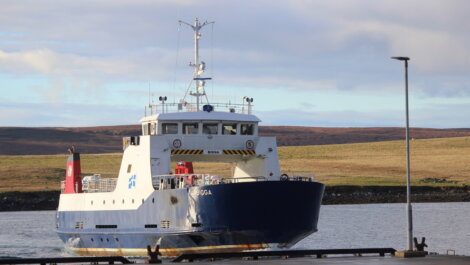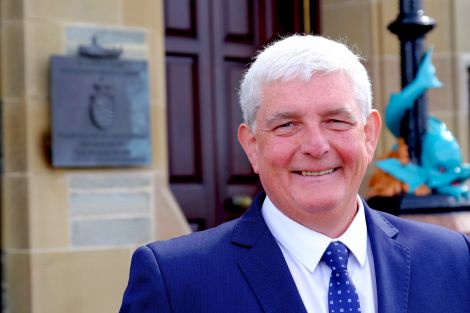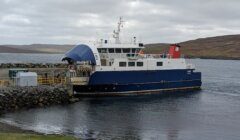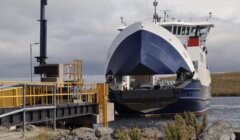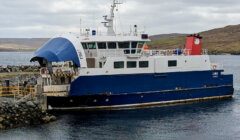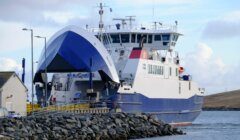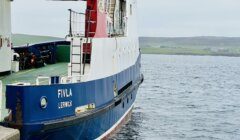Transport / Ferry agency staff bill reached nearly £640k last financial year
SHETLAND Islands Council (SIC) spent nearly £640,000 on agency staff in the last financial year to plug gaps in its ferry service – while some permanent posts have been vacant for two years.
This cost is made up mainly of wages but also includes £44,000 in accommodation, £51,000 in travel and nearly £54,000 in vehicle/mileage.
Figures obtained by Shetland News through a freedom of information request also show that the SIC used 42 agency staff in 2023/24 – double that of the previous year.
Director of infrastructure John Smith conceded it has been a “challenging” time for the ferry service – especially this year, with a lot of community feedback.
He said on one weekend earlier this year the SIC received more than 50 formal complaints after giving notice of forthcoming ferry disruption.
Smith said an ageing ferry fleet – as well as workforce – combined with competition from other marine sectors like aquaculture has resulted in staffing pressures.
This has been felt most in the North Isles, where there has been regular disruption in recent months as a result of a lack of cover.
A report is due to be presented to councillors next week on some options for change, such as different rotas and terms and conditions.
Temporary agency staff is one element of the council’s approach to filling staffing gaps in the ferry service, as well as relief workers and “pool” staff.
But the freedom of information figures show that the use of agency staff has grown in recent years.
In 2022/23 the cost of sea-based agency staff was just over £370,000, but it was nearly £640,000 the following year.
For the first three months of 2024/25 that figure sits at around £153,000.
Become a member of Shetland News
During these periods the total spend on accommodation has been £103,000, with travel costs roughly £90,000 and vehicle/mileage about £92,000.
The total agency wages spend between 2022/23 and the first three months of 2024/25 was nearly £880,000.
The costs, though, come under the financial package the SIC receives from the Scottish Government every year to cover the deficit in running ferries, which is currently around £23 million.
As of 1 August the ferry service had 113 permanent ferry staff and nine agency workers on rotations covering five posts.
But allied to this are some long-term vacancies.
For instance as of 30 June this year two mate roles on the Unst service had been vacant for around two years.
There have also been long-term vacancies on the Yell Sound, Fetlar and Fair Isle routes.
Smith admitted that there comes a point with hard-to-fill vacancies when a different approach is needed.
He also suggested the wages permanent and agency sea staff receive are not that different, although obviously there are added costs for accommodation and transport.
From a wider perspective Smith said a lot of this extra cost can effectively be offset by not having someone in the post they are covering.
“In some ways it’s less of a financial problem,” he said.
“It’s a lot of work to find them, and then an aggravation for everybody when there’s a lot of turnover, because you’re always working with somebody new, and finding somewhere for them to stay is quite a lot of effort too, especially during the summer.”
When asked why there have been continued difficulty in finding stand-in workers to cover staff sickness, Smith said it is “not just a question of finding somebody off the street that’s willing to come in and cover”.
“It’s somebody with the right tickets, the right familiarisation [on the vessel], the right availability,” he added.
Smith feels that the Covid pandemic in some ways had “masked” the challenges, with ferries running a skeleton service as well as fewer people travelling.
But demand has increased since, with the SIC director highlighting Unst where there is plenty of activity – the space sector, for instance – as well as tourist travel.
Smith, however, said there is a “bit of optimism” around two new initiatives regarding ferry staff.
One is a call for trainee deck staff earlier this year, which he said resulted in 60 applicants.
Smith said the SIC is also in the process of shortlisting and interviewing for roles on a different shift pattern which will be more like two weeks on, two weeks off – which he said seems to be the “emerging norm”.
“That maybe creates a bit of optimism, that if we worked with our existing staff and find ways of shuffling around shift arrangements then that might help to make us attractive at least to some folk,” Smith added.
When asked what staff morale has been like, Smith acknowledges that there is a sense of “being on the edge”.
“I think everybody is aware that there has been pressure here,” he added
“When services are cancelled or interrupted the folk that feel it most at the crew. They’re trying to deliver a service to their community, and they unavoidably get the frustration of the folk that travel.”
Smith said it is a problem for management as well, as they meant to be trying to fix the issues – and then it comes a “problem between management and sea staff”.
“We have a very good set of services that have created commuter connectivity for Bressay, Whalsay, Yell, Unst…and now they’re an absolutely critical part of the lifestyle of the people in the islands,” he added.
“Trying to keep these quite intensive commuter services operating day in day out…folk depend on them more, and when they’re interrupted it is more problematic.”
Become a member of Shetland News
Shetland News is asking its many readers to consider paying for membership to get additional features and services: -
- Remove non-local ads;
- Bookmark posts to read later;
- Exclusive curated weekly newsletter;
- Hide membership messages;
- Comments open for discussion.
If you appreciate what we do and feel strongly about impartial local journalism, then please become a member of Shetland News by either making a single payment, or setting up a monthly, quarterly or yearly subscription.






